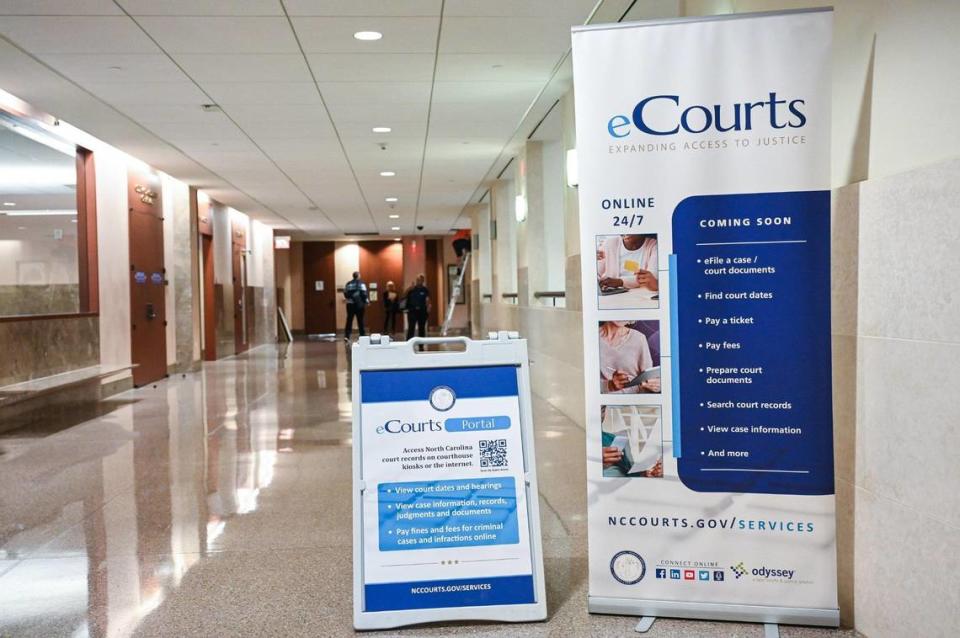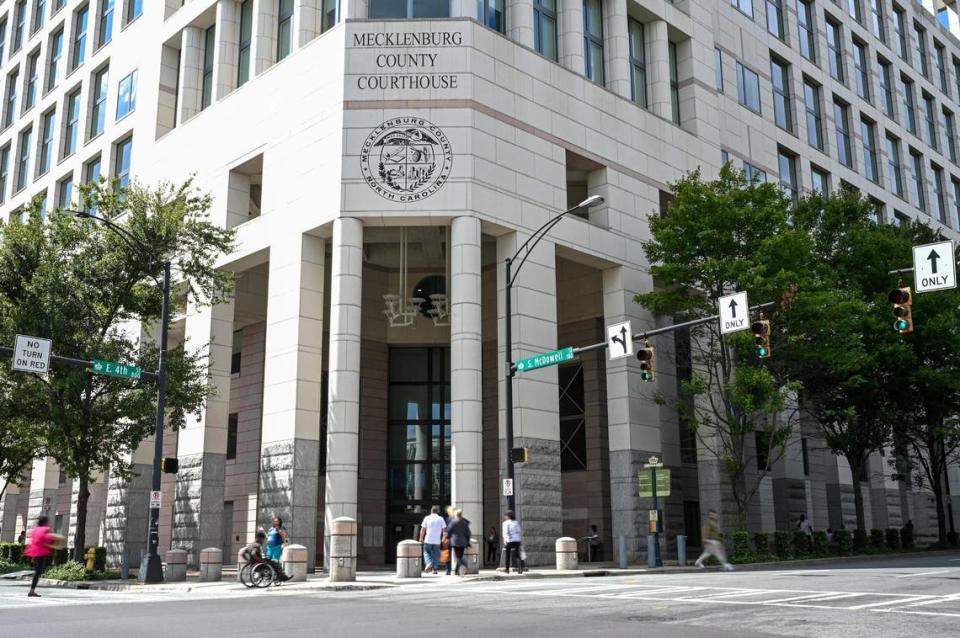Traffic court canceled for a week in Charlotte as courts roll out new records software
North Carolina’s new digital court records and case management system launched in Mecklenburg County Monday, ushering in a new era and creating some lag in courtrooms.
The rollout saw lawyers, judges and clerks switch from paper to digital records — a change that could bring efficiencies, but has forced adaptation in the meantime, some lawyers said.
“It’s just slow,” Chief District Court Judge Elizabeth Trosch said of court processes Monday, adding that there had been no major issues.
Court appearances for traffic pleas planned for this week have been rescheduled, as have some other court sessions.
Courthouse staff and lawyers have been preparing for the switch to eCourts for months. Clerks were pre-scanning thousands of cases in September, The Charlotte Observer reported. And lawyers have trained with the system.
It allows anyone with an internet connection to check records and to file documents online. Lawyers and judges are able to do much of their work from computers.
“Overall, Monday went well,” Graham Wilson, a spokesperson for the state Administrative Office of the Courts, said in a Tuesday email. “With the committed leadership of local judicial leaders, Mecklenburg County’s transformation to eCourts is off to a successful start.”
Attorney: System still has technical issues
The AOC is overseeing eCourts’ $100 million implementation across North Carolina. The software was developed by Texas-based vendor Tyler Technologies, which is facing a proposed class action lawsuit over a rollout in four pilot counties in February.
In courtrooms handling first appearances, the lawyers arguing, the judges giving orders and defendants’ family members watching painted a mostly familiar picture on Monday.
There was a difference, though: routine processes moved much slower.
First appearances — where recently arrested suspects see a judge — were broken up into two courtrooms on Monday.
The second courtroom finished business in the evening, at 6:52 p.m.
Stalls often came when lawyers and judges tried to transition to a new defendant, only to struggle to pull up information. Long pauses were marked by them staring at their computers, occasionally asking each other for case numbers to get back on track.

Longtime Assistant Public Defender Catherine El-Khouri couldn’t find information that prosecutors or a presiding judge could, or vice-versa, she said.
And the system “crashed” multiple times during court Monday, she said, forcing her to log out and back in.
“If we had to do the entire docket in one place, we’d be here till 10 o’clock,” she said.
“We received a few reports of modest latency yesterday,” Wilson, the AOC spokesperson, said in an email Tuesday. “System upgrades that ran last night appear to have successfully addressed the reported concerns. Both AOC and Tyler continue to monitor network performance.”
There were no system outages, he said, and support staff were “on-site to help individual users if they had login issues.”
“We’re not aware of any systemic access issues,” he said.
Citing public safety concern, DMV leader wants NC to pause Charlotte eCourts expansion
More real-time work
Another assistant public defender, Misdemeanor Chief Tony Purcell, said that lawyers and judges are doing more real-time work with the digital system.
Before, prosecutors would come in with support staff who would take on procedural work, like writing down new court dates.
Now, lawyers are doing that from their laptops, creating virtual “tasks” for clerks, who then pass it on to the presiding judge, Purcell said.
He had to interject a few times on Monday, and to let the court know that unrelated cases were being brought up in the wrong courtroom, he said.
“We’re driven on paper, and we’re used to paper, and it’s tangible and you can see it,” he said. “Now we’re kind of being forced to move off of that, and it’s just not as easy, especially for the people who’ve been in the system for so long, and that’s all we’ve done.”
There were moments when eCourts’ real-time nature proved useful, he said, like when he was able to get paperwork as he needed it. In the past, he might have had to take a trip to the clerk’s office.
District Attorney Spencer Merriweather anticipated some challenges over the next few weeks, but gave credit to “Olympian efforts” from people working in the courthouse, as well as help from the AOC.

Charlotte-Mecklenburg traffic court
At the AOC’s recommendation, the courthouse has made other adjustments to accommodate eCourts’ learning curve.
Traffic pleas planned for this week have been rescheduled, Natalie McKinney, a spokesperson for the trial court administrator’s office, said in an email. They will resume next week.
Dockets have also been cut shorter in some high-volume courtrooms, and other sessions have been rescheduled, she said.
“These temporary modifications were required to accommodate hundreds of court staff developing proficiency with new processes,” she said. “Our goals were to prevent significant delays and facilitate the timely processing of cases in the early days of developing proficiency. “

